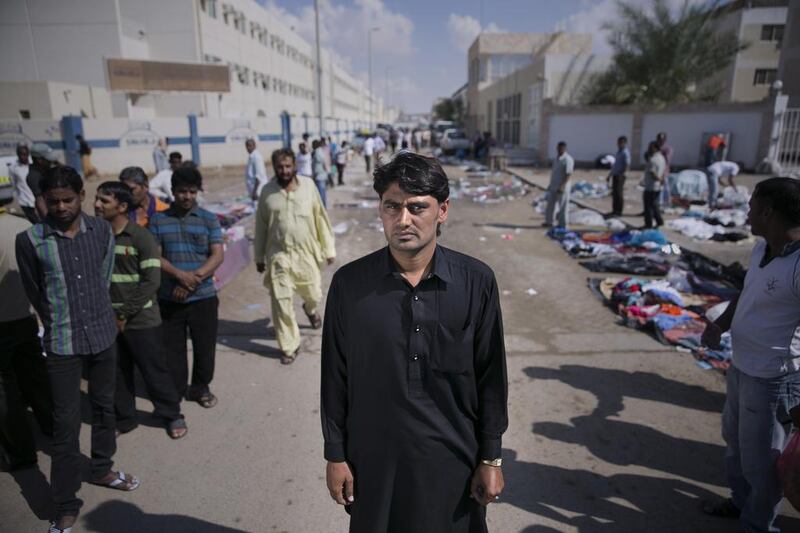ABU DHABI // Away from the bustling city, the gleaming towers and air-conditioned malls, there is another world.
It is a place where poor workers survive on small wages, but whose contribution is crucial.
Mohammed Khan hails from Pakistan and has lived in labour camps for the past 10 years.
He earns Dh120 a day, shares a room with 10 others and works tough shifts on building sites across Abu Dhabi.
“Working under the scorching hot and humid weather in the emirates, where temperatures can reach up to 50°C in summer, is no easy task,” he said.
Mr Khan, 32, worked for seven years as a carpenter with a building company in Dubai when he first arrived in the UAE. He earned just Dh22 a day.
Now based in the capital, he has risen to the rank of foreman with a company that certifies scaffolding.
“Being a civil foreman is not an easy job at all. It involves a paramount pressure to finish construction tasks on schedule,” Mr Khan said.
He starts work at 8am and finishes at about 5pm.
Mr Khan has to take the bus to whatever building site he is working on – sometimes it can take more than an hour, depending on traffic.
While he has been promoted and makes more money now, life in the Workers’ Village in Mussaffah was not exactly the one he dreamt about when he was a boy in Peshawar.
There he learnt carpentry skills from his father in their workshop.
At 22, he left for the UAE in search of a better life, one where he could send some money back to his wife, parents and extended family in Pakistan.
In 2004, he paid 50,000 Pakistani rupees to an agent for a visa – but now people are ready to pay up to 200,000 rupees (Dh6,849).
He thanks the Government for improving conditions for labourers. A decade ago, safety measures were not as good.
“We had to climb on upper floors through scaffolding without safety belts. Now no way,” he said.
Hours were also long then – he had to start work at 6am and would not finish until at least 6pm. By the time he got back to the labour camp it could be as late as 8pm.
After more than a decade spent working on the building industry front line, he has seen many tragic accidents. Once, 15 people were crushed to death when a wall fell on them.
But the UAE has implemented strict new rules over the years and safety is now paramount.
“Now we don’t begin the work until all safety steps are properly done. Because rules now at construction sites are very tough,” Mr Khan said.
With all the development across the country, the conditions at labour camps have also vastly improved.
“Labour camps are our world. The life here is different from the city’s enchanting lifestyles. We don’t have resources or transportation to travel to the city. Even, we are not allowed to keep a bicycle here.”
The food has also improved in the camps. At times there were issues when just one type of food was served to workers from many different nationalities. But now every taste is catered for and the camps hold parties on holidays.
Friends are the major strength here, Mr Khan said.
“We meet, greet and share all moments, which keep us refreshed. During festivities we don’t go out of the camps but we invite all our friends from other camps and hold a big food fiesta outside the gated boundary of the camp,” he said.
“We bring a goat and slaughter it there and cook, as we did this Eid Al Adha.”
But it is at night that thoughts turn to his wife and parents in Pakistan and he plans to return next year for good to start a family.
A decade ago, workers would have to wait for a month to get a letter from home or spend money on a public phone booth, as mobile phones were too expensive.
But now social media and sites such as Twitter, Facebook and Skype have helped to ease the loneliness.
Every evening the faces of their families from Pakistan, India, Bangladesh and elsewhere flicker into their camp rooms and they can talk about how their day went.
“I miss here only my family but new technology has helped this too,” Mr Khan said.
anwar@thenational.ae






